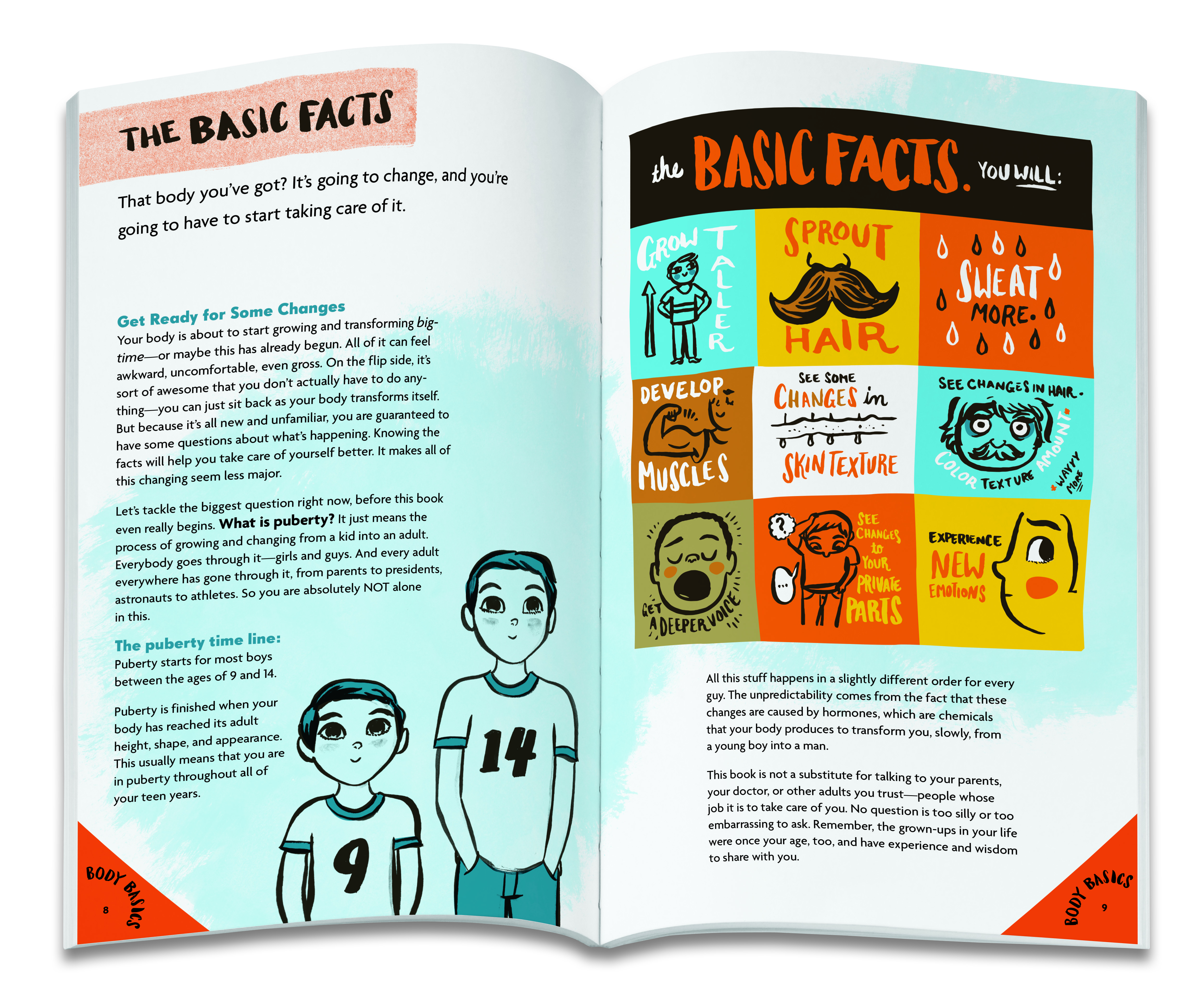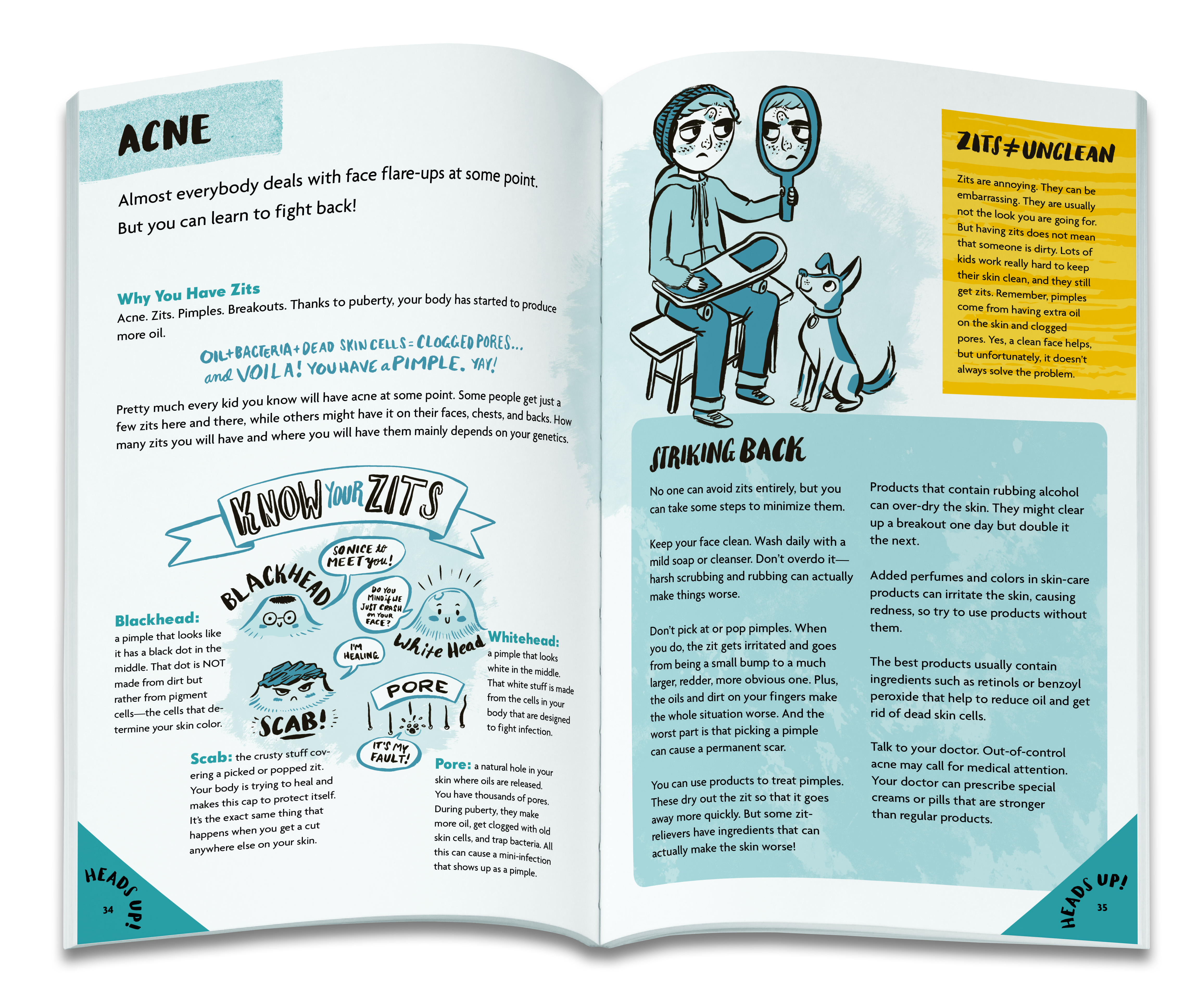Talking to Boys About Their Bodies
Written by Abbie Schiller
I’m a big believer in getting the awkward conversations started when the kids are little. Puberty is hard to talk about when kids are already going through it and especially if you haven’t had that kind of body talk before. But if you do it young, kids are curious and will still listen. Then, when kids are bigger, and ask the harder questions, you’ll have already established a level of comfort and trust.
When and how should parents start to talk to boys about their bodies and puberty?
I really believe it is never too early to talk about health and wellness. The basics of any puberty class involve nutrition and exercise, hygiene and sleep. You can start talking to a child as young as three or four about some of this stuff! When it comes to addressing body changes, there is no perfect age when you should begin.
But a couple of tips:
1. If you bring up a subject and it is clear your son is not ready to talk about it, it’s okay to press pause and tell him you’ll come back to it when he’s ready. But then come back to it down the road.
2. Use the real anatomical terms instead of nicknames, because, trust me, that will save a lot of confusion in the future!
What are the biggest take-aways from the book for parents of boys?
The book is really meant to be a conversation starter in a million different directions. So the biggest take-away is that many things will transform as you get older, from your body to your feelings to your friendships. There is a wide range of normal – everyone is NOT the same. It helps a tremendous amount to be able to talk about all of this stuff. “Guy Stuff” offers a ton of introductory-level information. Boys will have questions about at least some of it, and it helps to know that their parents (plus other trusted adults) are available to ask.
We hear that puberty is happening younger and younger. What did you learn in researching this book that surprised you?
I have followed the data on puberty for many years and, in fact, it was what I learned doing that research that really pushed me to write this book. We have known for a very long time that girls are entering puberty one to two years younger than they did a generation ago. But girls have also been socialized to talk about puberty and they have an enormous variety of resources on the subject. So as significant as the data was when it was first revealed, girls and their parents had mechanisms in place to manage it.
Meanwhile, a few years later when studies began to show the same earlier-onset of puberty for boys, it seemed like not many people took notice and the boys were left floundering. I think this has to do with the fact that the first stages of puberty in boys are largely invisible to most others. (Unlike girls with their moods and curves, boys tend to sweat and experience changes under the underpants).
Add to it that boys are socialized not to talk about much of this. Their fathers weren’t either, nor were their father’s fathers. So boys needed more information at a younger age but they didn’t ask for it, and neither did any of the adults around them. That’s pretty much why I pushed to write a book for them that covers information through middle school but was still appropriate for a third grader.
Your book goes in to some great detail about helping boys express their feelings and that we should stop with the notion that boys need to “toughen up.” Can you talk about some of those points you touch on particularly how we can help boys feel comfortable with and express their feelings without feeling ashamed?
Based upon the early reaction I have gotten to these pages in the book, it is clear to me that I am not alone in watching my son attempt to transform away from being a sensitive, sweet, expressive little boy. I listen to the phrases people use to praise him versus his sister, and the way that they react when he gets teary versus when she does. Our boys are taught to toughen up, and that’s a complicated prospect.
Because the truth is that we all need to thicken our skin as we grow older. But as a pediatrician, and especially as the mom of a boy, it is very clear to me that we ask our boys to harden, not just toughen. I couldn’t stop writing this particular section of the book because there’s so much there: identifying a feeling is different from managing one and communicating those feelings is yet another skill.
Girls seem to have more access to these conversations. Maybe because they seem to wear their emotions on the sleeves more often. But in my 20 years as a doctor, I have come to believe that kids grow up to be better versions of themselves when they are empathic and thoughtful. And they navigate adolescence more easily when they can are given permission to recognize and manage their emotions.
What are other ways we can encourage a healthy (mentally, physically) boy? We (The Mother Co.) get a lot of questions about children and masturbation (and many comments about shaming children about it) so if you wanted to address that topic here, we’d WELCOME it.
Just keep talking! The healthiest kids I know are the ones who are holistically healthy – they take care of their bodies and their minds. Every single child on earth has questions about what is happening inside of them. Just letting your kid(s) know that they can talk to you provides a sense of utter relief. Kids will engage in embarrassing or shameful or even wrong behavior. Sometimes the behavior is entirely normal but, if there is no dialogue around it, then they think it’s not okay. Talk to your child.
If you are not a family of talkers, come up with a better system that works for you. Some families pass notes, others only talk in places where you don’t have to make eye contact (like the car). Identify a person outside of the family who can be your child’s go-to in case he absolutely cannot ask or tell you something. Then give that person a head’s up! I have been the “trusted adult” for many of my kids’ friends, and I know what they are comfortable with me saying. And if you don’t know the answer, find someone who does like a doctor or educator.
Basically, just keep talking. Because as your kids get bigger, so do their worries and stresses.
In order to raise healthy boys, we need to let them know they have the tools they need at their disposal: us.
Would you recommend any other resources for parents of boys pre-teen and teen?
Guy Stuff is not a book about sex – it’s about bodies and brains and relationships and feelings. But it’s not about sex. There are a lot of fantastic resources on that subject – my favorite go-to is the It’s So Amazing series.
CARA NATTERSON, MD, is a pediatrician, consultant, and New York Times bestselling author of The Care and Keeping of You, a 3-book series with over six million copies in print.
A graduate of Harvard College and Johns Hopkins Medical School, Cara trained in pediatrics at University of California at San Francisco. She began practicing medicine in her home town of Los Angeles, where she cared for thousands of infants, children and teenagers. Eight years later, Cara founded Worry Proof Consulting, a first-of-its-kind practice offering parents open-ended time to discuss the topics that doctors could no longer squeeze into regular office visits. She is the Chair of the Board of Starlight Children’s Foundation, a 30-year old charity that brings technology, entertainment, and joy to children in nearly every hospital in America. She is also on the Medical Board of Advisors for The Honest Company, and has held seats on the boards of Baby2Baby and The John Thomas Dye School.
But more than any of this, Cara’s greatest feat to date is parenting her teenage daughter and her tween-age son with her husband Paul, a beloved cardiologist in Los Angeles.
The Mother Company aims to support parents and their children, providing thought-provoking web content and products based in social and emotional learning for children ages 3-6. Check out our Emmy winning children’s series, “Ruby’s Studio” on Netflix and Amazon along with our beautiful children’s books, music, and more. We want to be a truly helpful parenting tool… For you!
Posted in: Expert Advice, Tough Topics

